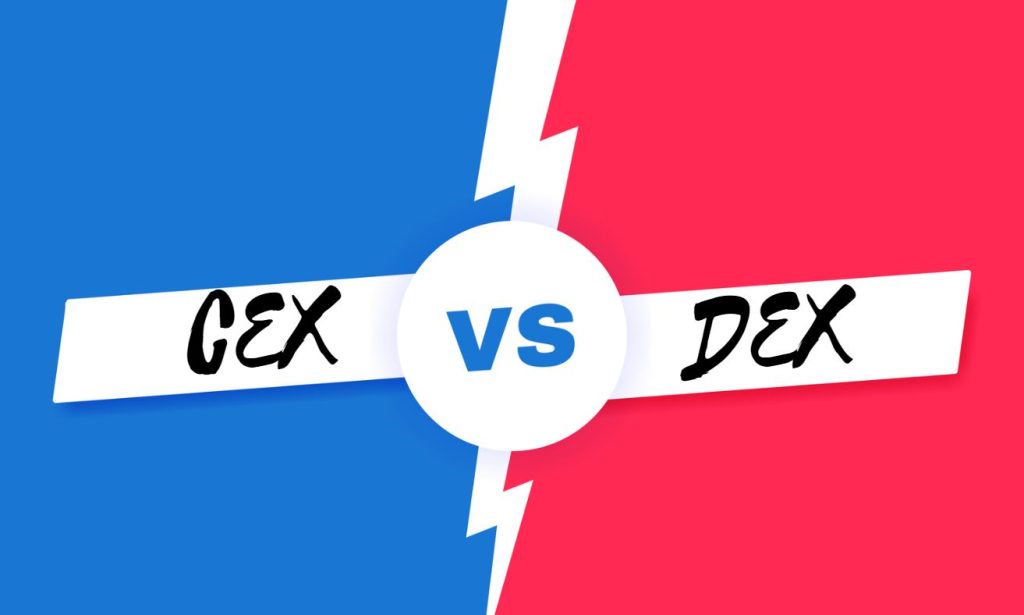The world of cryptocurrencies has experienced tremendous growth, transforming the way we approach finance and investments. With this growth, there’s a need for secure and reliable trading platforms to facilitate seamless transactions. Two main types of trading platforms have emerged to meet this demand: centralized exchanges (CEX) vs decentralized exchanges (DEX). In this article, we’ll dive deeper into the differences between these platforms, their pros and cons, and how to determine the right one for your trading needs, whether you’re a novice or a seasoned trader.
What is a Centralized Exchange (CEX)?
A centralized exchange (CEX) is a digital marketplace where users can buy, sell, and trade cryptocurrencies through a third-party intermediary. These intermediaries hold and manage users’ funds, acting as custodians while facilitating transactions. Some popular CEX platforms include Binance, Kraken, Coinbase Exchange, and OKEx.
CEX platforms offer various advantages that make them attractive to many traders. These benefits include user-friendly interfaces, high liquidity due to their extensive user base, fast transactions with the help of advanced trading engines, and a wide variety of trading pairs, including popular cryptocurrencies and fiat currencies.
However, there are some drawbacks to using CEX platforms. Users typically don’t have direct control over their private keys, meaning they must trust the exchange to manage and secure their funds. These platforms are also vulnerable to hacks due to their centralized nature, with several high-profile incidents resulting in significant losses for users. Additionally, CEX platforms are subject to regulatory oversight, which can impact their operations and may limit certain features or transactions.
What is a Decentralized Exchange (DEX)?
A decentralized exchange (DEX) is an alternative to centralized exchanges, allowing users to trade cryptocurrencies directly with one another without relying on a third-party intermediary. Instead of using a central authority to hold and manage funds, DEX platforms employ smart contracts and blockchain technology to facilitate peer-to-peer transactions.
Well-known DEX platforms include Uniswap, Bisq, and GDEX. These platforms offer a different set of advantages compared to CEX platforms. Anonymity is a significant benefit, as DEX platforms typically don’t require users to submit extensive personal information or undergo rigorous verification processes. Users also maintain control over their private keys, eliminating the need to trust a centralized authority to manage their funds.
Despite these benefits, DEX platforms have some limitations. They often suffer from lower liquidity, which can lead to price slippage and make it challenging to execute large orders. Transactions on DEX platforms can also be slower due to their reliance on blockchain confirmations, and the user interfaces may be less polished and more difficult for beginners to navigate.
Comparing CEX vs DEX: Key Differences
When deciding between a centralized exchange (CEX) and a decentralized exchange (DEX), it’s essential to understand the key differences between these two types of platforms. Each comes with its unique set of advantages and disadvantages, catering to different user preferences and requirements. Let’s dive into the main distinctions between CEX vs a DEX platforms:
| Feature | Centralized Exchange (CEX) | Decentralized Exchange (DEX) |
|---|---|---|
| Control Over Funds | Users must trust the exchange to manage and secure their funds | Users maintain control over their private keys and funds |
| Anonymity | Requires personal information and verification process | Generally anonymous, with no or minimal identity verification required |
| Transaction Speed | Faster, with advanced trading engines | Slower, relying on blockchain confirmations for transactions |
| Liquidity | High liquidity due to extensive user base | Lower liquidity compared to CEX platforms |
| User Interface | User-friendly, easy to navigate for beginners | Less polished, can be more challenging for beginners to use |
| Trading Pairs | Wide variety, including popular cryptocurrencies and fiat currencies | Limited variety, primarily focused on cryptocurrencies |
| Security | Vulnerable to hacks due to centralization | More secure, as they are not a single point of failure |
| Regulatory Oversight | Subject to regulations and oversight | Less susceptible to regulatory restrictions |
| Customer Support | Dedicated support teams to assist users | Limited or community-based support |
Control Over Funds
One of the most significant differences between CEX and DEX platforms lies in the level of control users have over their funds. In a CEX, the exchange acts as a custodian, holding and managing users’ funds on their behalf. As a result, users must trust the platform to secure their assets and handle transactions. On the other hand, DEX platforms allow users to retain control over their private keys, enabling them to trade directly with one another without relying on a third-party intermediary.
Security
CEX platforms are often more susceptible to security breaches and hacks due to their centralized nature. Hackers can target the exchange’s infrastructure, potentially gaining access to users’ funds and sensitive data. In contrast, DEX platforms are considered more secure since they utilize blockchain technology and smart contracts to facilitate transactions, making it more difficult for hackers to compromise the platform.
Anonymity and Privacy
When it comes to anonymity and privacy, DEX platforms typically have the upper hand. Users can trade cryptocurrencies without providing extensive personal information, allowing them to maintain their privacy. In contrast, CEX platforms often require users to undergo identity verification processes and submit personal information in compliance with regulatory requirements, which can compromise their anonymity.
Liquidity and Trading Volume
CEX platforms usually offer higher liquidity and trading volume due to their extensive user base and support for various trading pairs. This increased liquidity can lead to tighter spreads and better prices, making it easier for users to execute large orders without significantly impacting the market. DEX platforms, on the other hand, often have lower liquidity, which can result in price slippage and make it more challenging to fill large orders.
User Interface and Ease of Use
CEX platforms are generally known for their user-friendly interfaces and advanced trading tools, making them more accessible to beginners and experienced traders alike. They often provide features such as margin trading, futures trading, and stop-loss orders, which can enhance the trading experience. In contrast, DEX platforms may have less polished interfaces and limited trading tools, which can be more challenging for users to navigate, especially those new to the world of cryptocurrency trading.
Your choice between a CEX or DEX will depend on your priorities and preferences as a trader. If you value speed, liquidity, and a user-friendly interface, a centralized exchange may be more suitable. On the other hand, if you prioritize privacy, security, and maintaining control over your funds, a decentralized exchange could be the better option.
Future Trends in Crypto Trading Platforms
As the cryptocurrency ecosystem continues to evolve, we can expect trading platforms to adapt and innovate to cater to the diverse needs of traders. Here are a few trends we might see in the coming years:
- Hybrid Exchanges: Combining the best features of both centralized and decentralized exchanges, hybrid platforms aim to offer a more comprehensive trading experience. These exchanges could provide users with the convenience and liquidity of a CEX while maintaining the security and privacy offered by DEX platforms.
- Cross-chain Trading: As more blockchains and cryptocurrencies emerge, the need for seamless cross-chain trading will grow. Crypto trading platforms are likely to develop solutions that enable users to trade across multiple blockchains without the need for intermediaries.
- Decentralized Finance (DeFi) Integration: Decentralized finance has taken the crypto world by storm, and exchanges will likely incorporate DeFi services into their platforms. This could include lending, borrowing, and staking services, further enhancing the utility of trading platforms for users.
- Enhanced Security and Privacy: As cyber threats become more sophisticated, when comparing a CEX vs a DEX both platforms will need to prioritize security and privacy. We can expect to see continued development in areas such as multi-signature wallets, zero-knowledge proofs, and decentralized identity solutions.
- Regulatory Compliance: The regulatory landscape surrounding cryptocurrencies is ever-changing, and exchanges will need to adapt to new rules and guidelines. This could result in a more standardized and secure trading environment, benefiting both users and the wider crypto ecosystem.
Conclusion
Both centralized and decentralized exchanges play crucial roles in the cryptocurrency landscape, offering unique benefits and catering to different user preferences. As the industry continues to grow and mature, we can anticipate further innovation in trading platforms, making it easier than ever to access and trade cryptocurrencies.
Ultimately, the choice between a CEX vs a DEX depends on your individual priorities as a trader. By understanding the key differences between these platforms and keeping an eye on future trends, you can make informed decisions about where and how to trade in the dynamic world of cryptocurrency.









